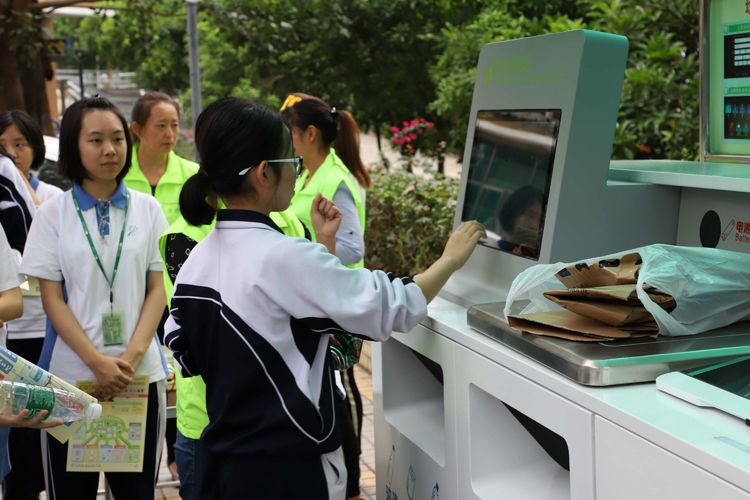City mobilizes garbage sorting
Writer: Wang Jingli | Editor: Holly Wang | From: Shenzhen Daily | Updated: 2020-09-01

A student with the high school campus of Shenzhen Foreign Languages School weighs a bag of kraft paper on a smart garbage classification bin. Courtesy of Shenzhen Foreign Languages School
Shenzhen begins to practice mandatory waste sorting today, which means garbage classification is now a compulsory daily practice for each citizen rather than an elusive concept or an eloquent slogan, Shenzhen Party chief Wang Weizhong said at a government meeting yesterday.
Garbage sorting is a concept that is easy to understand but hard to maintain because this is a change of lifestyle and habits. The success of the project needs the support of all citizens, he said.
“We should deeply understand the significance of garbage sorting, take the opportunity of being one of the pilot cities for building a zero-waste city, speed up the establishment of an economic system featuring green, low-carbon and circular development and become a model for sustainable development,” Wang said at the meeting, which was convened to mobilize the public for the cause.
He urged to improve garbage sorting, transport and disposal procedures, provide a benchmark in the city’s performances in garbage sorting with advanced cities worldwide and reduce emission discharge at all garbage incineration plants and landfill sites across the city above the European standards.
Mayor Chen Rugui stressed that each government department should carry out the implementation of the garbage sorting regulations in a down-to-earth manner in a bid to shape Shenzhen into the cleanest city in the country.
Official statistics show Shenzhen produces 29,500 tons of household garbage on average each day.
Residents who do not practice garbage sorting will be punished from October. A transitional period will be exercised in September for the residents to adapt to the new rules of waste classification, according to the city’s urban management and law enforcement bureau.
From October to November, punishment will be doled out to those who resist garbage sorting regulations outright.
After December, supervision of garbage sorting will be normalized as random inspections will be given.
Nationally, Beijing began mandatory garbage sorting May 1 this year while Shanghai implemented compulsory garbage sorting July. 1 last year.
As the second-largest producer of urban solid waste in the world, China saw more than 202 million tons of household waste generated all over 202 large and medium-sized cities in 2017, an increase of 7.13 percent from the year before, according to the Ministry of Ecology and Environment.
A decision taken at the fourth plenary session of the 19th Central Committee of the Communist Party of China (CPC) in late October last year has renewed the country’s pledge to promote trash classification nationwide as part of the move to establish a mechanism for efficient utilization of resources and develop ecological stewardship.